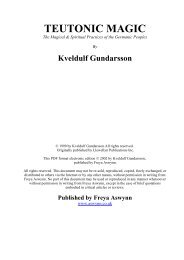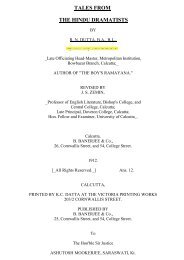Untitled - Awaken Video
Untitled - Awaken Video
Untitled - Awaken Video
You also want an ePaper? Increase the reach of your titles
YUMPU automatically turns print PDFs into web optimized ePapers that Google loves.
Chapter 6. The Sky 142<br />
as those promoted by Frazer, Anderson, or Kaufmann were related to the idea<br />
that religion must have developed from a primitive form comprised of vegetation<br />
and fertility Gods since these were the only things that a cave-dwelling hunter and<br />
gatherer could have been concerned about. When these men wrote about Germanic<br />
mythology, they did so with a historical approach; the “old Gods had passed on.”<br />
To them this was obvious and inevitable because the natural evolution of society<br />
from the simple agrarian to the much more complex industrial/ scientific necessarily<br />
created the need for a “new God,” being more sophisticated Himself, and, therefore,<br />
more sympathetic and suitable to the needs of a new world.<br />
Later, beginning in the late 1800’s and continuing on for nearly a century, the<br />
development and practice of behavioral sciences such as psychology, sociology, neurology,<br />
and anthropology, helped to produce a whole new breed of “interpreters”<br />
which includes the famous Freud, Jung, and their descendants, Georges Dumezil,<br />
Jan DeVries, and a list of followers much too long to be included here. Their interpretations<br />
included much material that had come before, but they also modified some<br />
of it to suit the development of the “new sciences.” This generation of interpreters<br />
believes that the Gods have not passed completely away but that they continue<br />
to live on in the folk-, collective-, cultural-, or genetic memories of mankind as<br />
archetypes, and that they resurface on a regular basis to guide folk towards their<br />
eventual destinies as whole and complete beings. This resurfacing of archetypal<br />
thought-patterns has been interpreted as the cause or at least the facilitator of<br />
every great event of mankind from time immemorial. 1<br />
By continuing to pursue this line of reasoning, these new behavioral scientists believe<br />
that their understanding of archetypes will eventually lead to the understanding<br />
of why people do what they do; at any rate, that is the theory. For these scientists,<br />
the Gods do not live outside human consciousness but are actually part of its very<br />
fabric; they live within the very neurochemical patterning of human existence. The<br />
new move in sciences is towards either existentialism or Taoism, saying that there<br />
is no such thing as objective existence, that all perception is subjective, i.e. can<br />
be had only from the viewpoint of the observer. The observer and the observed<br />
are inextricably intertwined so that it becomes impossible, in a Cartesian sense,<br />
to determine the existence of anything outside the self. Oddly enough, however,<br />
these same men of science continued to present their material from the traditional<br />
viewpoint of the “objective observer”; they were not able to make a clean break<br />
from the viewpoint of their predecessors. Right or wrong, this anthropocentric view<br />
1 Carl Jung, the psychologist and foremost promoter of the ”archetype theory” wrote an essay<br />
in the 1930’s called ”Woden” which attempted to show how an entire society could be lead to<br />
accept a single worldview. The upshot of the essay was that Germany was being reshaped by the<br />
northern Germanic archetype of Woden (ON Óðínn).
















